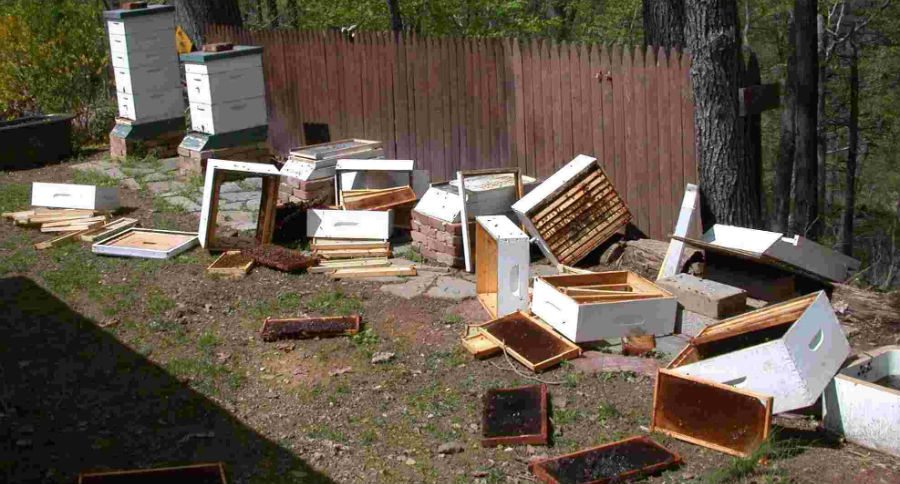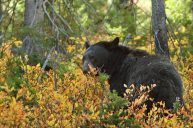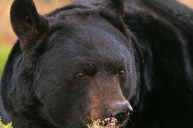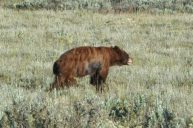Michigan beekeepers are complaining about the increased bear population and the resulting damage more bears are doing to apiaries.
You might think that beekeepers are an easygoing lot, given to working slowly and maintaining a positive, upbeat frame of mind. After all, raising honeybees is a happy occupation. But beekeepers in Michigan are getting a little fed up with what they see as officials turning a deaf ear to their fight against hive-wrecking black bears.
"We've been complaining on deaf ears," says Traverse City beekeepers Larry Hilbert. "It feels like a bureaucracy out of control. They didn't care about out problem. All they care about is more bears."
The 'they' is the Michigan Department of Natural Resources.
The DNR has purposefully tried to raise the state's bear population for the sake of Michigan bear hunters.
"We'd like to see more bears on the landscape," said Tim Dusterwinkle, president of the Michigan Bear Hunters Association. "We value the bear as the premier game animal in the state."
To that end, the DNR had lowered the number of bear tags in recent years in an effort to bolster the bear population. It worked. Bear numbers are up 29% since 2012 in the Lower Peninsula and up 47% since 2000. The DNR estimates there are 2,112 bears in the region. Upper Peninsula bear numbers are up 11% in the same period, to 9,699 bears.
And you know bears; they're always hungry, and all of those hungry bears will utterly destroy a honeybee apiary if given the chance. They can't help themselves, they will gorge on the brood, the honey, the adults - everything - leaving behind a shamble of busted hives and dead bees.
"I'm a fourth-generation beekeeper; my sons are five," said Hilbert, owner of Hilbert's Honeybees. "I have more bear problems in a month than my dad had in a 40-year career."
Professional beekeepers aren't just concerned with the loss of honey either. They lose revenue that comes from using their bees to pollinate crops. Pollinators like bees are currently a troubled species, as most people know. Hungry bears exacerbate the problem.
"The bear basically knocks the hive over and systematically destroys everything. There is no rebuilding the hive," Hilbert said. "You not only lose the hive, you lose honey production for that year, too.
"He'll eat the bees, the brood, the larvae. He eats everything but the wood."
And of course with more bears comes an increase in human vs. bear conflicts, whether it be auto vs. bear collisions, bears becoming a nuisance to homeowners' bird feeders or trash, or even bears attacking humans.
The DNR has responded to beekeepers' cries for help, as well as to an increase in bear vs. human incidents in the general public. They're raising the number of bear hunting tags from 80 last year to 155 this year in the 10-county area of western Michigan from the Leelanau Peninsula south to Muskegon County, designated by the DNR as the Baldwin Bear Management Unit.
They are also increasing the numbers of bears that can be harvested in both Peninsulas over last year: increasing the Upper Peninsula harvest by 52 bears to 1,170 total, and increasing the northern Lower Peninsula harvest by 112 to 355 total.
"I think we've been a bit too conservative with our harvest in the Northern Lower Peninsula in the past," DNR wolf and bear specialist Kevin Swanson said. "Much of that is because of our hunters. The houndsmen, some of the bait hunters, they want more bears on the land. They always push us to have fewer tags. There's a lot of people unhappy with us this year because we increased the tags."
Even though wildlife management is largely science based, it's really a combination of human desires and the land's environmental carrying capacity for animals.
"There's a social tolerance, as well as the biological capacity, that needs to be considered," said Swanson. "We've probably exceeded the social tolerance of bears in the Baldwin Bear Management Unit right now."
The DNR has also worked with beekeepers to install electric fences to dissuade marauding bears from their hives. They help, but aren't a cure-all.
Tim Dekorne, president of the Michigan Commercial Beekeepers Association, said,
"I've got over $100,000 in bear fencing material. It doesn't always work. And it has to be managed. The problem is, I have over 150 locations. The chance of me catching a bear in the bee yard is slim to none. I can't be everywhere at once. And there are places now where there are bears where there never used to be bears."
Dekorne also believes that beekeepers should have the right to trap or shoot nuisance bears. Some beekeepers who have suffered the ravages of black bears and feel that the state has been ignoring their plight, do just that...illegally. Some states, like Maryland, have made it legal for beekeepers to defend their property from bears.
"The motto is, 'Shoot, shovel and shut up,'" he said. "Their laws turn honest, hardworking taxpayers into criminals."
Like what you see here? You can read more great articles by David Smith at his facebook page, Stumpjack Outdoors.
NEXT: Todd Orr's Horrific Account of How He Survived Two Grizzly Bear Attacks in One Day





